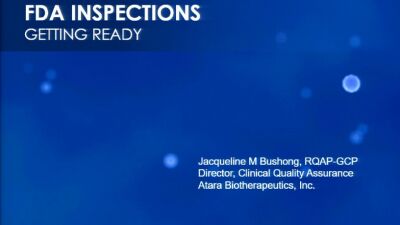- Background and the regulations
- Bioresearch Monitoring Inspections (BIMO) objectives are (1) to protect the rights, safety and welfare of human research subjects and (2) to assure the quality, reliability, and integrity of data collected
- FDA inspections are data driven while EMA inspections are process driven
- FDA inspections are sponsored by triggers
- NDA/BLA submission
- Sites high enrolling
- Conducting trials in multiple therapeutic areas
- Outliers
- Study closure due to noncompliance
- Unusual data
- Subject complaints
- Whistleblowers
- Preparation of a clinical site
- Logistics
- Process handling document requests
- Tour
- Sponsor assistance
- Document Retrieval
- Study Files, records and patient charts.
- Being proactive in retrieval of records
- Document Review
- Documentation should be in order and up to date
- Any changes in protocol should be incorporated
- Staff Preparation
- BIMO compliance manual
- inspection etiquette
- handling request for documents
- External Assistance
- Listen carefully
- Answer honestly
- Logistics
- Preparation of a sponsor
- Logistics
- Inspection room, QA representative, Scribes, Subject matter experts
- Prep Room, QC Personnel, Document Management
- Quiet Room, Briefing subject matter experts
- Tools like storyboards, BIMO Checklist, Distribution Lists, Contact Lists, templates, databases, readiness guide to be prepared
- Supplies preparation
- Interview Practice Sessions, Management, Monitoring and Quality Assurance
- Logistics
- General information
- Interview Advice
- Mock Inspection: Executed using inspection room
- BIMO inspections are pre-announced- Investigators provide IRB# and FDA Form 482.
- Delays in scheduling or refusal can result in product to be deemed adulterated
Regulatory Science Symposium: Monitoring and Auditing Session 2: FDA Inspections - Getting Ready (2016)
In this series, we will discuss regulatory complexities regarding clinical trials.
Regulatory Science
Responsible Conduct of Research
Course Syllabus/Topics
Acknowledgement
Accompanying text created by Amelia Spinrad | Regulatory Knowledge Support Specialist | spinrad@usc.edu

